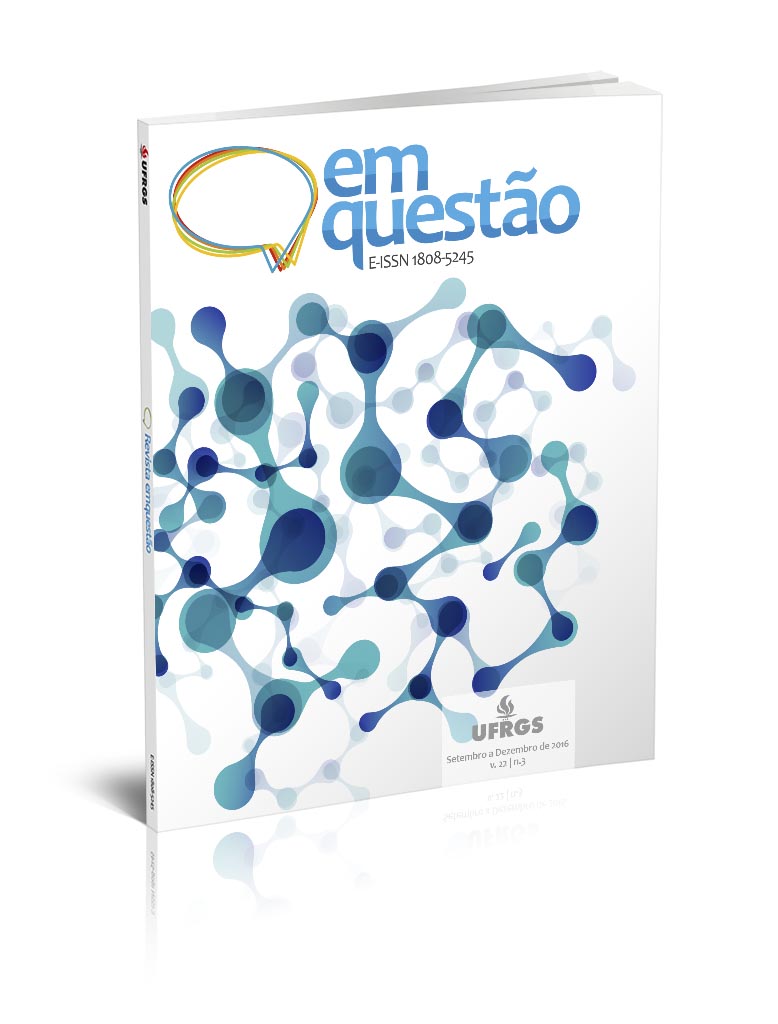School libraries: global trends Abstract
DOI:
https://doi.org/10.19132/1808-5245223.36-55Keywords:
School library. Technology. Learning. Librarian. Collection development.Abstract
This article discusses the technology and teaching/learning process transformation and the impact of these changes at the school libraries, specifically in terms of collection development, space design and the role of librarians. The literature analysis shows a tendency to adopt learning models based on collaborative construction of knowledge, with an emphasis on understanding learning and teaching activities in several environments. The school libraries can accept and subsidize the varied teaching activities, transforming itself not only in a place of information appropriation, but also in a place where knowledge is produced through connected and diversified collaborative activities. The librarian needs to strengthen their domination of technology in order to obtain, manage, produce and share information. The reading incentive continues to be important but it needs to be expanded to different media and formats.Downloads
References
AAKER, David A. Administração estratégica de mercado. 9. ed. Porto Ale-gre: Bookman, 2009.
AUSTRALIAN LIBRARY AND INFORMATION ASSOCIATION. 50:50 by 2020. Kingston: ALIA, 2013. Disponível em: <http://www.alia.org.au/sites/default/files/documents/about/ALIA-5050-by-2020_2.pdf>. Acesso em: 20 nov. 2015.
BRASNFORD, John D.; BROWN, Ann L.; COCKING, Rodney R. (org). Co-mo as pessoas aprendem: cérebro, mente, experiência e escola. Tradução Carlos David Szlak. São Paulo: Senac, 2007.
BREEDING, Marshall. Tech trends and challenges for K-12 school libraries. Computers in Libraries, Medford,NJ, v. 33, n.7, p. 26-29, Sept. 2013.
CANINO-FLUIT, Ana. School library makerspaces: making it up as I go. Teacher Librarian, Lawrence, KS v. 41, n. 5, p. 21-27, jun. 2014.
CORDEIRO, Alexander Magno et al. Revisão sistemática: uma revisão narrati-va. Revista do Colégio Brasileiro de Cirurgiões, Rio de Janeiro, v. 34, n. 6, p. 428-431, nov./dez. 2007. Disponível em: <http://www.scielo.br/pdf/rcbc/v34n6/11.pdf>. Acesso em: 07 Jun. 2016.
COOPER, O. P.; BRAY, Marty. School library media specialist-teacher collabo-ration: characteristics, challenges, opportunities. TechTrends, Cham, v. 55, n. 4, p. 48-55, 2011.
EASLEY, Michelle; YELVINGTON, Marie. What's in a name: reimagining the school library program. Teacher Librarian, Lawrence,v. 42, n. 5, p. 21, jun. 2015.
GASQUE, Kelley Cristine Gonçalves Dias. Centro de Recursos de Aprendiza-gem: biblioteca escolar para o século XXI. Revista Digital de Biblioteconomia e Ciência da Informação, Campinas, v. 11, n. 1, p. 138-153, jan./abr., 2013. Disponível em: <http://www.sbu.unicamp.br/seer/ojs/index.php/rbci/article/view/565/2057>. Acesso em: 9 jul. 2016.
GASQUE, Kelley Cristine Gonçalves Dias; TESCAROLO, Ricardo. Desafios para implementar o letramento informacional na educação básica. Educação em Revista, Belo Horizonte, v. 26, n. 1, p. 41-56, apr. 2010. Disponível em: <http://www.scielo.br/pdf/edur/v26n1/03.pdf>. Acesso em: 9 jul. 2016.
GRIGSBY, Susan. Re-imagining the 21st Century School Library: From Storage Space to Active Learning Space. TechTrends, Cham , v. 59, n. 3, p. 103-106, may./june. 2015.
HARRIS, Christopher. Fact or fiction? Libraries can thrive in the Digital Age. Phi Delta Kappan, Arlington, v. 96, n. 3, p. 20-25, nov. 2014.
HAY, L. Experience the "shift": Build an iCentre. Teacher Librarian, Law-rence, v. 39, n. 5, p. 29-35, jun. 2012.
HOUGH, Michael. Libraries as iCentres: helping schools. Australian School Library Association, Melbourne, Victoria , v. 25, n. 1, p. 5-9, 2011. Disponível em: <http://www.asla.org.au/publications/access/access-commentaries/icentres.aspx>. Acesso em: 11 set. 2015.
JOHNSON, Doug. Power up!/ the new school library. Educational Leadership, Alexandria VA , v. 71, n. 2, p. 84-85, oct. 2013. Disponível em: <http://www.ascd.org/publications/educational-leadership/oct13/vol71/num02/The-New-School-Library.aspx>. Acesso em: 6 jul. 2016.
JOHNSON, L. et al. NMC Horizon Report: edição educação Básica 2015. Austin, Texas: The New Media Consortium, 2015. Disponível em: <http://cdn.nmc.org/media/2015-nmc-horizon-report-k12-PT.pdf>. Acesso em: 6 jul. 2016.
JORGE, Marcos. Universidade discute inovação e acessibilidade no ensino. São Paulo: UNESP, 2014. Disponível em: <http://www.unesp.br/portal#!/noticia/15958/universidade-discute-inovacao-e-acessibilidade-no-ensino/>. Acesso em: 6 jul. 2016.
LOERTSCHER, D. V.; PREDDY, L.; DERRY, B. Makerspaces in the School Library Learning Commons and the uTEC Maker Model. Teacher Librarian, Lawrence, v. 41, n. 2, p. 48-51, dec. 2013.
LOERTSCHER, D. V.; KOECHLIN, C. Theory and research as the founda-tional elements of a learning commons. Teacher Librarian, Lawrence, v. 39, n. 3, p. 48-51, fev. 2012. v. 39, n.5, p. 74, feb. 2012.
O'CONNELL, Judy; BALES, Jennie; MITCHELL, Pru. [R]Evolution in Read-ing cultures: 2020 vision for school libraries. The Australian Library Journal, [S.l.], v. 64, n. 3, p. 194-208, 2015. DOI:10.1080/00049670.2015.1048043
SHAW, Carolyn; FLYNN, Darren; BARRETT, Lynn. The BRIDGE LEARN-ING COMMONS: A whole school approach to learning for the future: first steps. The School librarian, Sydney, v. 62, n. 1 p. 3 -5, 2014.
SULLIVAN, Margaret. Divine design: how to create the 21st-century school library of your dreams. School Library Journal, New York, NY, v. 57, n. 4, p. 26-32, apr. 2011. Disponível em: <http://www.slj.com/2011/04/sljarchives/divine-design-how-to-create-the-21st-century-school-library-of-your-dreams/>. Acesso em: 6 jul. 2016.
TAYLOR, Natalie Greene; SUBRAMANIAM, Mega; WAUGH, Amanda. the school libraian as learning alchemist: transforming the Future of Education. American Libraries Magazine, Chicago, fev. 2015. Disponível em: <http://americanlibrariesmagazine.org/2015/02/26/the-school-librarian-as-learning-alchemist/>. Acesso em: 9 set. 2015.
TENDÊNCIA. In: DICIONÁRIO do Aurélio Online. c2016. Disponível em: <http://dicionariodoaurelio.com>. Acesso em: 12 set. 2015.
Downloads
Published
How to Cite
Issue
Section
License
Copyright (c) 2016 Em Questão

This work is licensed under a Creative Commons Attribution 4.0 International License.
Authors who publish with this journal agree to the following terms:
Authors will keep their copyright and grant the journal with the right of first publication, the work licensed under License Creative Commons Attribution (CC BY 4.0), which allows for the sharing of work and the recognition of authorship.
Authors can take on additional contracts separately for non-exclusive distribution of the version of the work published in this journal, such as publishing in an institutional repository, acknowledging its initial publication in this journal.
The articles are open access and free. In accordance with the license, you must give appropriate credit, provide a link to the license, and indicate if changes were made. You may not apply legal terms or technological measures that legally restrict others from doing anything the license permits.













